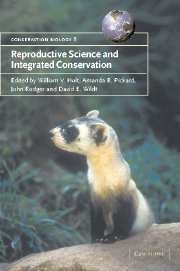Book contents
Foreword
Published online by Cambridge University Press: 21 January 2010
Summary
By playing a role in the near-annihilation of a species, Theodore Roosevelt, the president of the United States at the turn of the twentieth century, unwittingly laid the groundwork for the most dramatic triumph yet in the use of artificial insemination (AI) to rescue a species from extinction.
In the early 1900s, waves of immigrants from Europe settled in the American Midwest. As humans transformed the land, they declared war on a perceived pest: the prairie dog. That might have seemed an affront to Roosevelt, an ardent conservationist who was once quoted as saying, ‘When I hear of the destruction of a species, I feel as if all the works of some great writer had perished.’ Apparently, however, Roosevelt didn't think much of the literary aspirations of prairie dogs. Delighted at the booming agricultural productivity in the country's heartland, his administration donated poison and other weapons to the farmers. By World War I, only two prairie dogs were left for every hundred alive when Roosevelt had assumed the presidency in 1901.
An innocent victim of the eradication campaign was the black-footed ferret, which preyed on the prairie dogs. By 1979, there were no more of these weasel-like raiders to be found. The species rose from the dead two years later, when 130 black-footed ferrets were discovered in a quiet corner of a Wyoming ranch. Calamity struck in 1985, when canine distemper and sylvatic plague wiped out all but 18 individuals.
- Type
- Chapter
- Information
- Reproductive Science and Integrated Conservation , pp. xiii - xviPublisher: Cambridge University PressPrint publication year: 2002

